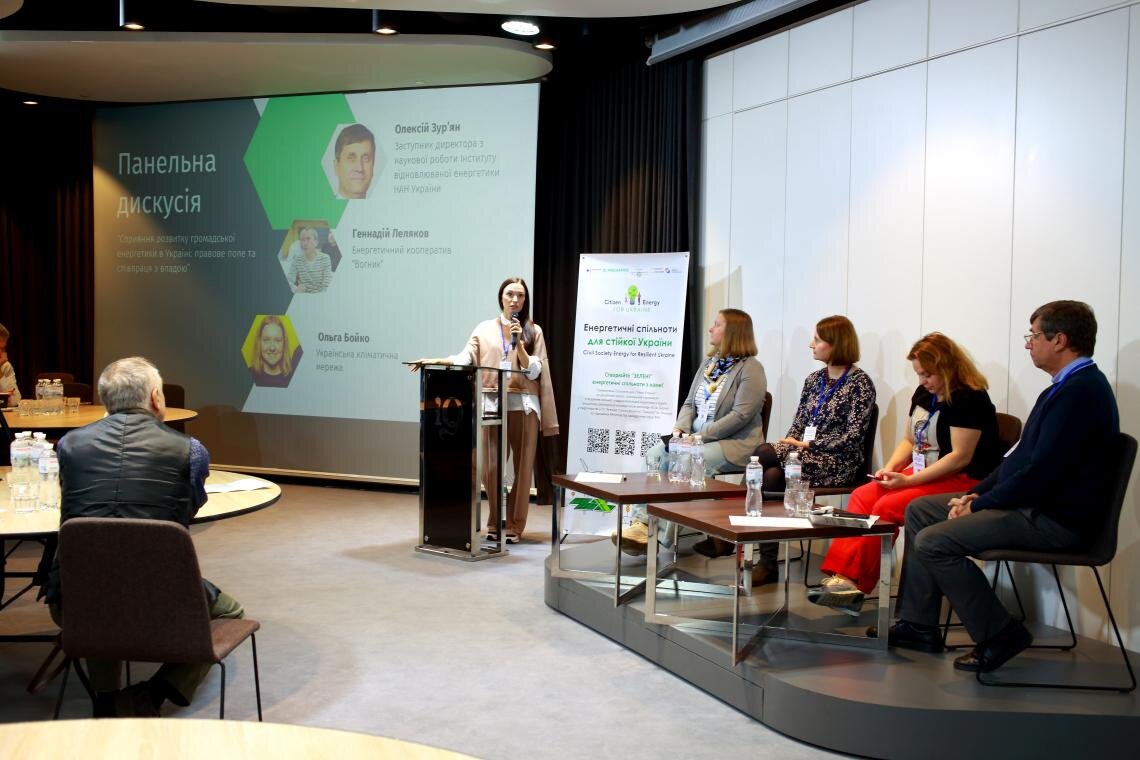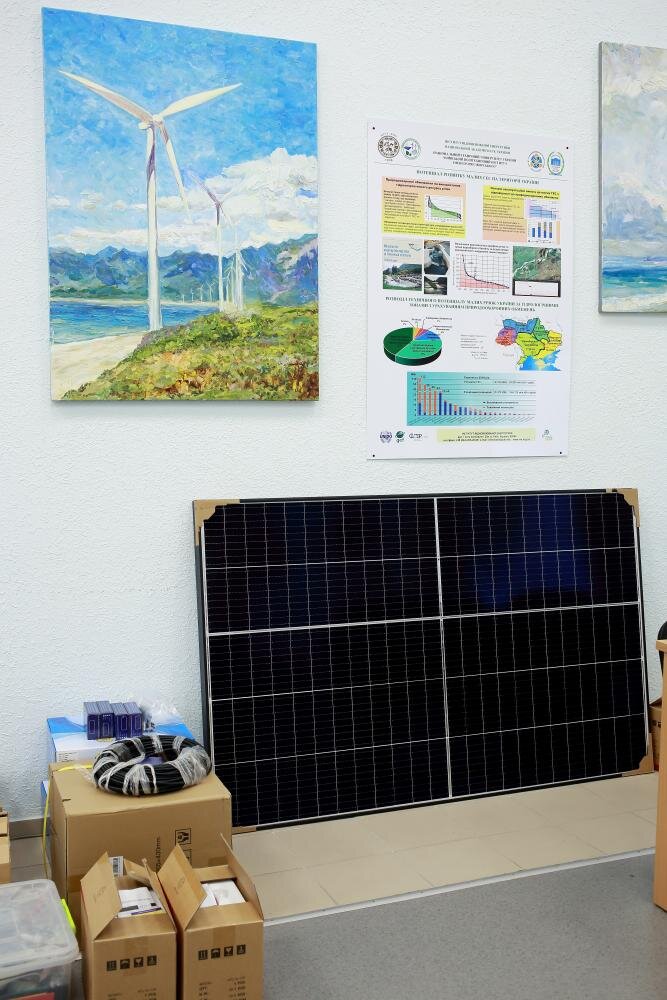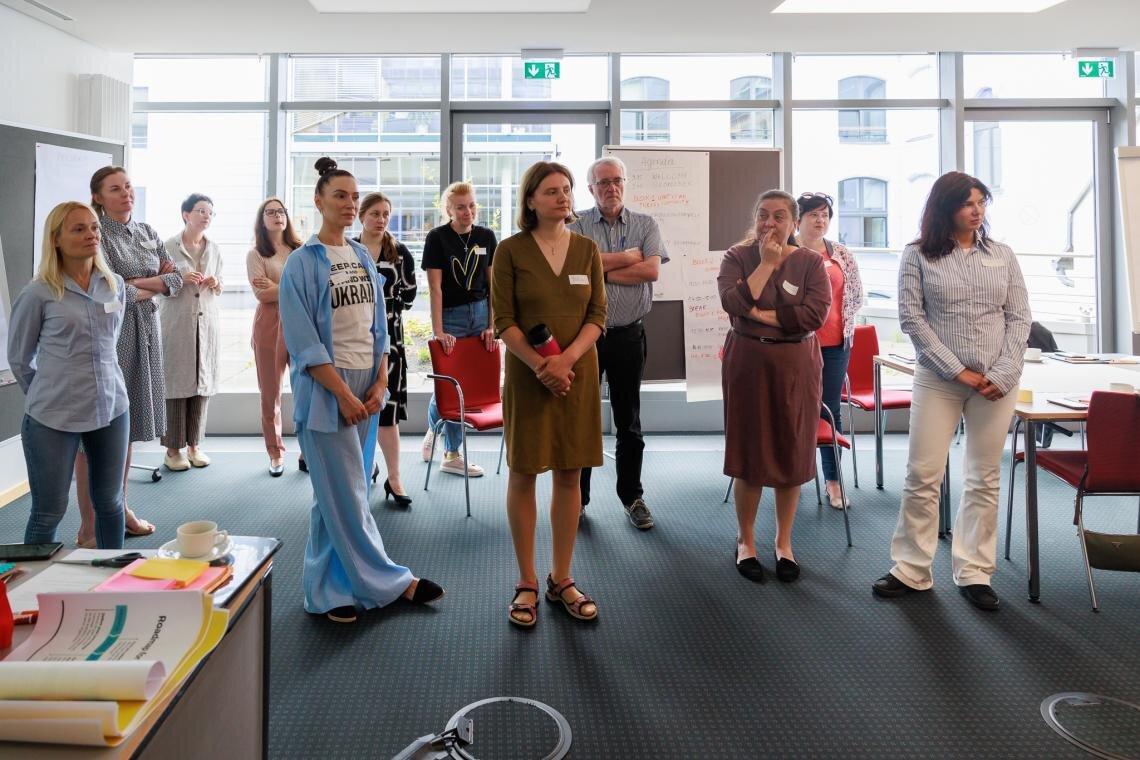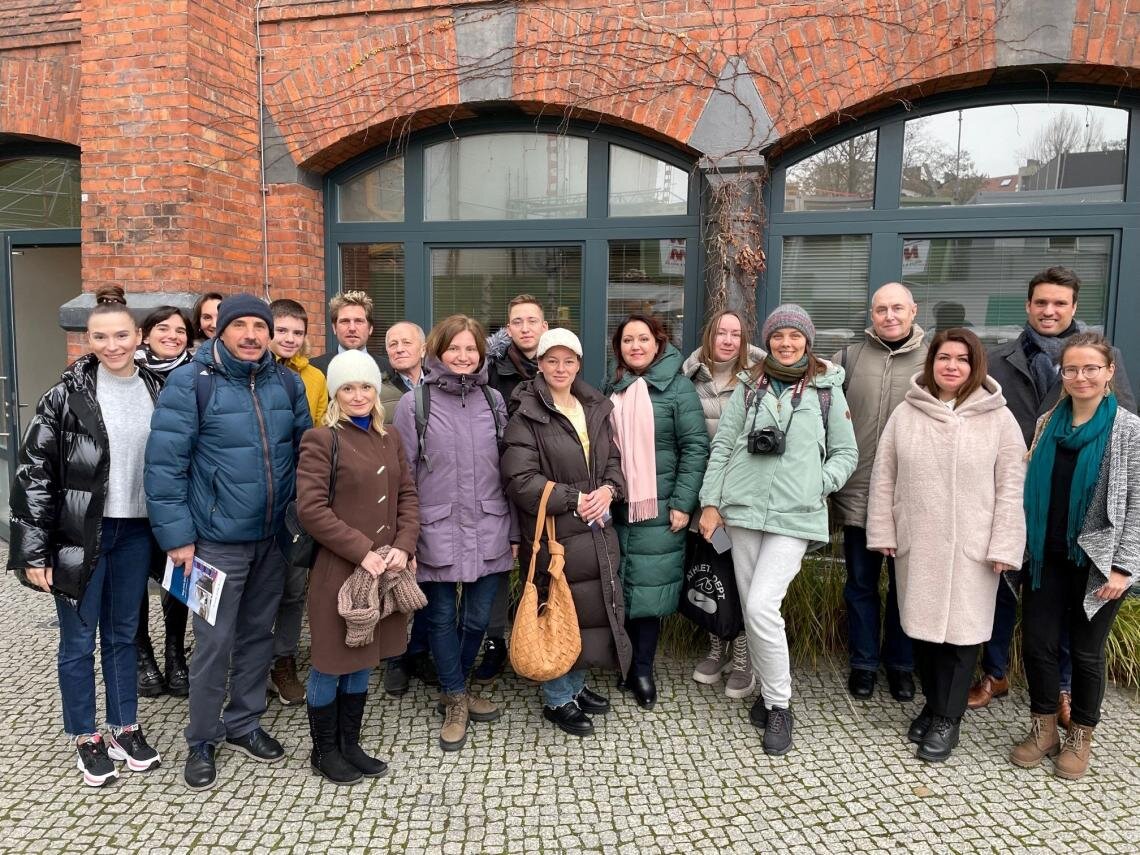
On October 27, 2023, a professional discussion "Prospects for the development of green energy communities in Ukraine" was held in Kyiv as part of project "Civil Society Energy for a Sustainable Ukraine" project. The participants were experts from the renewable energy sources (RES) sector and representatives of business and the public from various cities of Ukraine.
The speakers of the event were:
- Joosep Veerme, Energiaühistu Energy Cooperative, Tallinn, Estonia.
- Nataliya Zaitseva-Chipak, Director of research company SOCIOINFORM, Lviv.
- Julia Eichhofer, Project Coordinator, wechange eG, Berlin.
- Oksana Kysil, National Expert, Ukrainian Iniative „Agreement of Mayors“.
- Oleksiy Zur'yan, Deputy Director for Research at the Institute of Renewable Energy of the National Academy of Sciences of Ukraine, Kyiv.
- Gennadiy Lelyakov, Chairman of the Board of the Energy Cooperative "Vognyk", Lysychansk.
The event was opened by Yevgenia Chobotova, Representative of the Economic Department of the German Embassy in Ukraine, who emphasized the role of energy communities in the development of the green energy sector in Germany: "Germany supports Ukraine in the direction of RES at all levels: at the state level, at the level of enterprises and communities, and private individuals. In the future, energy communities could become a factor of energy sustainability and decentralization of energy supply in Ukraine".
Joosep Veerme presented the energy cooperative Energiaühistu, which is a pioneer in Estonia. At the time of its founding in February 2021, the cooperative had only 36 members, and thanks to active communication, it was possible to increase the membership base to 94 people. The community organizes festivals, gatherings and trainings for cooperative members, energy workshops together with equipment providers and local municipalities, and events within the framework of European leadership programs. This makes it possible to raise the educational level of people actively involved in energy projects in Estonia.
In addition, in the first part of the event Natalia Zaitseva-Chipak presented the study "Financial, technical and legislative aspects of creating energy communities in Ukraine", in which the prerequisites , barriers and recommendations for creating energy communities were analyzed during expert focus groups. The study determined that energy communities have a number of advantages, of which the main is a guaranteed energy supply. The second factor is cost savings, as well as additional jobs, taxes to the community budget, reduction of CO2 emissions and reputation gains. At the same time, the following barriers to the creation of energy communities were identified:
- lack of financial resources,
- lack of appropriate human capital in communities (project managers, technical specialists),
- low interest of ordinary residents in creating energy communities due to low awareness of communities and potential benefits from their creation,
- lack of social capital (the ability to negotiate and trust),
- lack of active state efforts to support energy communities,
- insufficient adaptation of the legislation to the needs of creating energy communities.
The study made a number of recommendations to improve the conditions for the creation of energy communities, including improving the regulatory and technical prerequisites, the regulatory framework, reforming education, developing standard recommendations and step-by-step instructions for local authorities, and creating umbrella organizations to inform and support the capacity of energy communities. The press release of the study is available here:
In the second part of the event, a panel discussion was held, opened by Julia Eichhofer with a presentation on the European experience of creating and operating energy communities. For example, in Germany, the share of energy cooperatives in the total volume of electricity production from renewable sources is 3.5%. Ms. Eichhofer highlighted the following necessary steps to create an energy community:
- Establishing a partnership between potential members of the cooperative, local authorities and representatives of interested businesses;
- Choosing a financial model;
- Assessment of energy needs of the community;
- Choice of technology for generating renewable energy;
- Implementation of the project.
The speaker provided a number of proposals to support the creation of energy communities in Ukraine. In the regulatory sphere, it is necessary to establish the right to independent production, consumption, and receiving fair payment for excess electricity. From an economic point of view, innovative financial solutions should be encouraged. Finally, an important step would be to create a one-stop shop for citizens to inform about public energy, to include public energy in national and local development and climate plans. Ms. Eichhofer's presentation is available here.
Oksana Kysil, a representative of the Covenant of Mayors, emphasized that it is necessary to talk about energy communities at the national and local levels through the prism of energy poverty. If we are determined to implement consistent energy directives, it is necessary to fix energy communities at the level of legislation, this will allow launching state and local programs and facilitate work with donors. There is already a significant trend towards decentralization of critical infrastructure, and Khmelnytskyi and Vinnytsia have made significant progress in this direction. At the same time, Mrs. Kysil emphasized that the destruction of the central heating system is unacceptable, because it makes energy communities at the level of apartment buildings impossible.
Oleksii Zurian, a representative of the Renewable Energy Institute, spoke about the assessment of the future development of the renewable energy sector. The green transition is one of the components of Ukraine's energy independence, and it is impossible without the involvement of communities. The conditions for the development of renewable energy in Ukraine are quite favourable, so as of the beginning of 2022, the introduction of green energy amounted to 10.5 GW, of which 7,586 MW was solar power generation, mainly in the South and East of the country. After the full-scale invasion, the country's energy system was severely affected, and the losses of the renewable energy sector amounted to 9.84 GW. In April 2023, the Cabinet of Ministers of Ukraine approved the Energy Strategy of Ukraine until 2050, which envisages Ukraine's achievement of carbon neutrality in the energy sector by that time. However, the main issue today is not only energy generation, but also energy storage, electricity and heat accumulation. Energy storage through green hydrogen comes first, and in this sense, the Renewable Energy Institute is working on training and has already developed the Hydrogen Strategy of Ukraine. The speaker's presentation can be viewed here.
Finally, Gennadiy Leliakov, Chairman of the Board of the Vogonik Energy Cooperative, shared the history of the cooperative's establishment and activities. The Vohonik Energy Cooperative was established in 2019 with the assistance of the Norwegian Refugee Council in Lysychansk, Luhansk Oblast, and had 12 shareholders. During the war, the city was left without power, and heat became a vital necessity in winter. The main raw material of the cooperative was wood chips, and the main goal was to provide heating on their own. For a year, the members of the cooperative did not use gas heating, as what they produced on their own was enough. According to Mr Leliakov, the form of energy communities is promising and can help many people who have been left without electricity and heat. Especially in the affected areas, it is necessary to resume operations, but this is difficult due to low financial capacity. At the same time, grants and external funding can be attracted to get things started. At the same time, Gennadiy Leliakov believes that motivated people should be involved in energy communities, as they have to work with very difficult and outdated legislation.
In summary, the discussion raised a number of important issues, including an imperfect legislative framework, lack of financial and human resources for the implementation of community renewable energy projects. At the same time, all participants agreed on the high natural potential of renewable energy in Ukraine, as well as the urgent need for decentralisation of energy and heat supply, in which energy communities can play a key role.




























